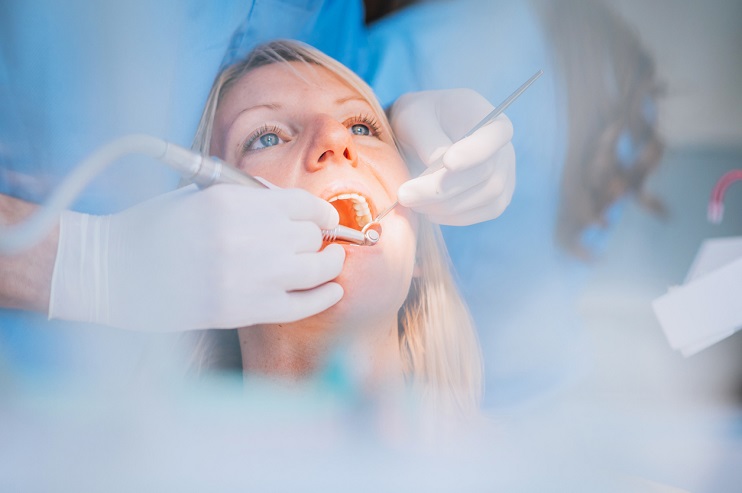
Scaling and Root Planing
Scaling and root planing are non-surgical procedures directed at removing the cause of gingival inflammation. This is accomplished by cleaning the dental surfaces below the gums. These procedures are most effective in patients who are suffering from inflammatory gum diseases such as gingivitis and mild to severe chronic periodontitis.
Related Services:
Here are some reasons for Scaling and Root Planing
- Prevent and Remove Disease: The bacteria that cause periodontal disease have the potential to travel through the body. Scaling and root planing remove this bacteria and its potential to spread.
- Restore tissue health: Bacterial growth and chemicals produced by the bacteria irritate the gums and result in pain and inflammation. By removing these irritants, inflammation and pain are removed, and healing can begin.
- Protect the teeth: A product of bacterial growth is calculus (tartar) and plaque. When plaque accumulates, it covers the teeth above and below the gums, hardens, and becomes calculus. Plaque and calculus do not allow for proper cleaning. Improper cleaning results in dental cavities, decay, and gum disease. Scaling and root planing remove this plaque and calculus (tartar).
The Scaling and Root Planing Treatments involve:
Scaling– The Hygienist takes an Ultrasonic instrument that is specifically designed to remove plaque and calculus buildup on crown and root surfaces. This instrument is placed against the tooth and through its vibrations removes the plaque and calculus.
Root Planing– Using specialized hand and ultrasonic instruments, your hygienist will plane (scrape) the root surfaces of your teeth. This ensures that all of the calculus and plaque are removed. This procedure allows your gums to heal.
Educational Video:
Our Dental Office Locations
Same and Next Day New Patient Appointments Available!
Glendale
8519 N 59th Ave, Glendale, AZ 85302, United States
Cave Creek
28255 N Tatum Blvd Suite 4, Cave Creek, AZ 85331, United States
Phoenix
1820 W Thunderbird Rd suite 1, Phoenix, AZ 85023, United States
Why to Come to Our Greater Phoenix, Arizona Area Dentist for Dental Bridges
AZ Family Dental has the experience and expertise you need when looking for the best dental care. We excel at providing preventive care and addressing problems that develop from missing teeth. Our ability to recognize small issues before they grow into big ones sets us apart from other Phoenix-area dental offices.
We also embrace technology, which helps us treat our patients more efficiently and effectively. Our state-of-the-art equipment can cut down on appointment times and even the number of trips you need to make to our office for treatment. We stay abreast of developing trends and employ them to assist our patients. Time is of a premium for so many of our patients. They like to get things done as quickly as possible so that they can get back to their busy days.
What else makes AZ Family Dental the best choice to handle your dental bridges? We offer:
- Individualized care: We examine each patient to determine what’s best for their case. We don’t believe in a one-size-fits-all approach. You may be a great candidate for dental bridges while we recommend someone else with a similar issue try a dental implant.
- Exceptional staff: Our staff truly cares about you and your treatment. We’ve been seeing many of our patients for years, and we forge bonds that feel more like family. We greatly appreciate you entrusting your dental care to us.
- Outstanding history of care: Our dental practice has been a fixture in the greater Phoenix, AZ area community for more than four decades, which tells you a lot about our reliability. We care about this area and providing the best service to everyone in it. We’ve developed a reputation based on the quality of our services, and we’re very proud of that.
When you need porcelain dental bridges, you can count on us to set you up with an appointment quickly and explain the procedure thoroughly. We value your trust in us.
Take Proper Care of Your Dental Bridges
After receiving dental bridges, our patients receive home care instructions on how to best care for their new dental work. Remember regular dental visits combined with good eating habits and oral hygiene help lengthen the life of your bridge. They can last for years when you follow our directions and continue to brush and floss regularly.
Learn More About Porcelain Dental Bridges
The longer you put off a dental bridge procedure, the greater your chance of developing complications, such as temporomandibular joint disorder or even gum disease. When you address a missing tooth proactively, you can preserve the integrity of your bite and decrease the chances of drifting teeth, which could lead to the need for further dental procedures.
Talk to us to learn all the options you have for dental bridges and other procedures to replace missing teeth. Call us or contact us online.
Frequently Asked Questions for Scaling and Root Planing
Our dentists use a local anesthesia during the procedure so you won’t feel any pain. You may feel pressure or discomfort if you have more sensitive teeth, but most patients report little to no issues.
Scaling and root planing is an effective and long-lasting procedure. You’ll typically need one or two yearly treatments to maintain a healthy smile. This allows for consistent deep cleaning without going over the top and irritating the gums.
Wait until the local anesthesia has worn off to eat, usually around 2 hours. Stick to soft foods for the first 48 to 72 hours and chew with the teeth on the opposite side of your mouth. Scaling and planing can increase gum sensitivity in the first several hours, so avoid alcohol, and hot or spicy foods until your gums are fully healed.
It can take up to a month or more (typically four to six weeks) for your gums to heal completely following the procedure. How long it takes depends on the amount of plaque that needs to be removed and how much pressure was placed on your gums.
The main disadvantage of scaling and root planing is increased tooth sensitivity. Common symptoms post-procedure include soreness and throbbing, but these are temporary and go away as the gums heal.
Avoid hot, spicy, or hard foods following the procedure (around 48 hours post). Your teeth will be sensitive, and certain foods and alcoholic beverages can trigger pain and discomfort.
Yes, a scaling and root planing procedure is minimally invasive, and you’ll only need a local anesthetic to minimize pain and discomfort.

